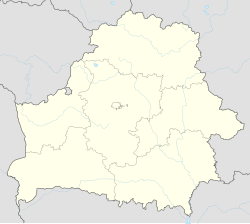Nalibaki
You can help expand this article with text translated from the corresponding article in Belarusian. (December 2022) Click [show] for important translation instructions.
|
Nalibaki | |
|---|---|
| Nalibaki Налібакі | |
 Church of Assumption of Holy Virgin in Nalibaki | |
| Coordinates: 53°45′46″N 26°28′08″E / 53.76278°N 26.46889°E | |
| Country | |
| Region | Minsk Region |
| District | Stowbtsy District |
| Time zone | UTC+2 (EET) |
| • Summer (DST) | UTC+3 (EEST) |
Nalibaki (Belarusian: Налібакі, Polish: Naliboki, Russian: Налибоки) is an agrotown in Minsk Region, in western Belarus.
History
During the times of the Polish–Lithuanian Commonwealth, since 1555[1] the settlement belonged to the family of the Radziwiłł magnates. Eventually it has grown into a miasteczko. Since 1722 it was the home of a glass factory founded by Anna Radziwiłł, closed in 1862.
After the Second Partition of Poland, since 1793 it belonged to the Russian Empire. In 1896 it was part of Powiat oszmiański Vilna Governorate, Russian Empire.[1]
In 1919 a battle of the Polish-Soviet war occurred nearby. [citation needed]
Nalibaki was part of the Second Polish Republic throughout the interwar period, in gmina Naliboki, Powiat stołpecki, Nowogródek Voivodeship.
Following the 1939 Soviet invasion of Poland, it was annexed to Byelorussian SSR of the Soviet Union. During World War II, the Jewish population of Nalibaki was massacred by the Germans, with some escaping and joining the Soviet partisans, while 129 Poles were massacred by Soviet partisans on May 9, 1943 (see the Nalibaki massacre).[2]
On August 6, 1943, Naliboki was pacified again, this time by German troops, as part of the so-called 'Operation Hermann', and its inhabitants were deported deep into the Reich for forced labor.[3]
See also
References
- ^ a b Dagnoslaw Demski, NALIBOKI I PUSZCZA NALIBOCKA — ZARYS DZIEJÓW I PROBLEMATYKI, p. 63
- ^ (in Polish) Gazeta Wyborcza, January 25, 2009, Daniel Craig a sprawa polska
- ^ Kazimierz Krajewski, IPN O. w Warszawie (2006-12-31). "Wies na kresach polnocno–wschodnich pod dwiema okupacjami". martyrologiawsipolskich.pl. Retrieved 2019-07-21.
Further reading
- Верхняе Панямонне: альманах лакальнай гісторыі, Вып. 1, Мінск 2012.
External links
- Radzima.org: Catholic Church of the Assumption of the Blessed Virgin Mary
- IPN investigation: "Omówienie dotychczasowych ustaleń w śledztwach w sprawach o zbrodnie"
- Remembering Naliboki: "Dorastanie pod dwiema okupacjami: Naliboki"

